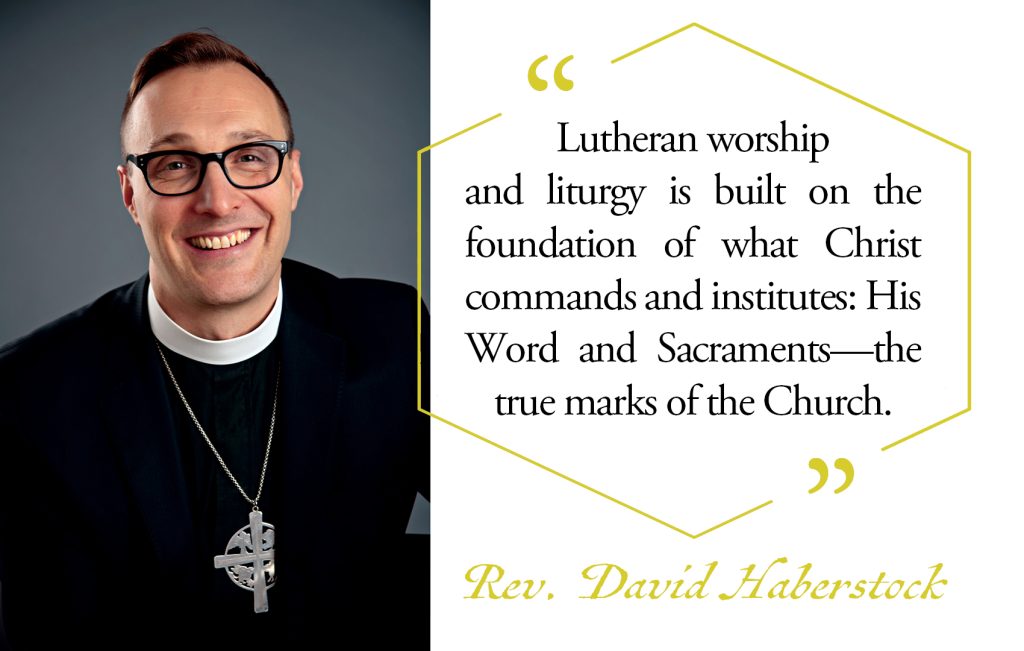Mystery vs. Mysticism
 by David Haberstock
by David Haberstock
How do you identify the true Church? Where can it be found? These are important questions for the sake of a peaceful conscience and assurance in faith. For if you do not know that your congregation is really the “Church” then everything else, including your salvation, comes into question.
Our Lutheran Confessions say this about how to identify the Church: “[The Church] has outward marks so that it can be recognized. These marks are the pure doctrine of the Gospel and the administration of the Sacraments in accordance with the Gospel of Christ” (Ap.VII.5).
That beautiful word “sacrament” comes into English from Latin where the term was used by the Church to denote “a mystery; a sacrament; something to be kept sacred.” “Mystery,” as in when St. Paul said of holders of the Office of Ministry: “This is how one should regard us, as servants of Christ and stewards of the mysteries of God” (1 Corinthians 4:1).
Many Christian churches in North America have their own distinguishing marks. In his book, Has American Christianity Failed?, Bryan Wolfmueller identifies four marks in particular: revivalism, pietism, mysticism, and enthusiasm. These alternate “marks of the Church” surround us in North American culture, and can creep into our own thinking and faith, robbing us of peace.
In my last column, I addressed enthusiasm. Today we’re considering mysticism. Mysticism is the idea that you can have direct, unmediated contact with God inside of yourself. In mysticism, God speaks to you internally—in your heart—rather than in His Word and Sacraments, the places where He has promised to be.
Mysticism affects what you expect spiritually, especially during worship. Lutheran worship can seem “boring” compared to the emotional highs of our entertainment culture because it rejects mysticism. Lutheran worship and liturgy is built on the foundation of what Christ commands and institutes: His Word and Sacraments—the true marks of the Church. It does not promise an emotional experience but does offer Christ’s presence and gifts.
Lutheran worship and liturgy is built on the foundation of what Christ commands and institutes: His Word and Sacraments—the true marks of the Church.
Christ and His gifts come through Word and Sacrament, not emotional experience. This is, therefore, an indirect or mediated experience of our Lord Jesus. He is where He promises to be: where two or three are gathered (Matthew 18:20), in His Sacraments (Matthew 26:26-28; 28:19-20), and in His proclaimed Word (Romans 10:14-17). And this all comes to you from outside, instead of happening inside you.
By contrast, mystical experience is inside you—in your feelings. This means you have to be into it, enjoy it, and feel intensely emotional. The worship of much of North American Christianity is intentionally emotional because it is built on mysticism. It desires to “experience” God in places other than where He says He can be found. It seeks an “experience” of the presence of God internally.
In Lutheran worship, you can have wonderful experiences as you hear His Word and receive His Sacraments, as you confess your sins and have them absolved, and even in prayer as you pour out your complaints and the Holy Spirit reminds you of God’s promises to you in His Word. The Gospel is good news of great joy, after all! But emotional experience is not the aim. Assurance of the forgiveness of sins and fellowship with God is, and they come objectively through Christ’s Word and Sacraments regardless of our emotions.
Martin Luther, dealing with charismatic abuses in his own day, put it this way: “We must constantly maintain this point: God does not want to deal with us in any other way than through the spoken Word and the Sacraments. Whatever is praised as from the Spirit—without the Word and Sacraments—is the devil himself” (SA 3.VIII.10).
God does not promise to give you an “experience” of His presence. And what happens if you have the “experience” one week but not the next? Where is God if you don’t continually “experience” Him? Has He abandoned you? Have you displeased Him if you don’t “experience” Him every week? Many people have had their faith shipwrecked through such “mysticism,” mistaking emotional highs for “real” evidence of God at work in their lives.
 May God help us learn to be pleased and satisfied with “boring” old liturgical worship, free of mysticism—for this worship bears the true marks of the Church (Word and Sacrament), and Jesus is truly found there!
May God help us learn to be pleased and satisfied with “boring” old liturgical worship, free of mysticism—for this worship bears the true marks of the Church (Word and Sacrament), and Jesus is truly found there!
———————
Rev. David Haberstock is Lutheran Church–Canada (LCC)’s Central Regional Pastor.





